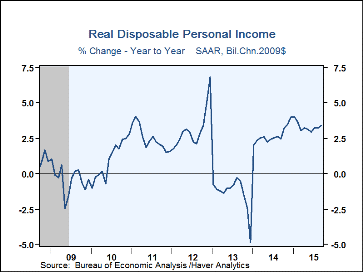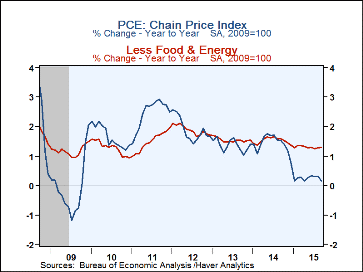 Global| Oct 30 2015
Global| Oct 30 2015U.S. Personal Spending & Income Inch Higher; Prices Ease
by:Tom Moeller
|in:Economy in Brief
Summary
Personal consumption expenditures edged 0.1% higher (3.4% y/y) during September following an unrevised 0.4% August increase. It was the smallest gain since January and missed expectations for a 0.2% rise in the Action Economics [...]
Personal consumption expenditures edged 0.1% higher (3.4% y/y) during September following an unrevised 0.4% August increase. It was the smallest gain since January and missed expectations for a 0.2% rise in the Action Economics Forecast Survey. Adjusted for a dip in prices, spending gained 0.2% (3.2% y/y). Real motor vehicle purchases jumped 1.5% (6.2% y/y), the third consecutive month of strength. Clothing purchases increased 0.8% (4.2% y/y) in real terms following a 0.2% dip. Constant dollar buying of recreational goods & vehicles ticked 0.1% higher (7.2% y/y) after a 0.5% rise. Real gasoline purchases fell 1.1% (+4.9% y/y) and the constant dollar value of eating out dropped 0.6% (-0.1% y/y). Real spending on services rose 0.3% (2.8% y/y) after a 0.4% increase. Real spending on recreation services rose 0.8% (1.4% y/y) after declining 0.5%. Health care spending advanced 0.4% (4.6% y/y) in real terms following a 0.3% increase but real housing & utility spending gained just 0.1% (1.3% y/y) following a 0.9% rise.
Personal income improved 0.1% (4.1% y/y) on the heels of five consecutive 0.4% increases. A 0.2% rise had been expected. Wage & salary income was little changed (3.7% y/y) after two straight months of 0.5% gain. Rental income rose a moderate 0.4% (7.1% y/y) following a 0.3% rise. These gains compare to three monthly increases during Q2 of roughly 1.0%. Proprietors earnings also rose 0.4% (3.7% y/y) after no change. Dividend earnings jumped 0.5% (5.0% y/y) for a second straight month but interest earnings notched 0.1% higher (3.9% y/y) for the third consecutive period. Transfer receipts improved 0.1% (4.4% y/y) following a two straight 0.4% increases. The gain was held back by a 2.4% decline (-10.4% y/y) in unemployment insurance benefits as well as a 0.1% dip (+4.3% y/y) in social security payments. Medicare income rose 0.4% (3.8% y/y) for the third straight month.
Disposable personal income improved 0.1% following five straight months of roughly 0.4% increase. The 3.6% y/y gain remained the strongest since February. Adjusted for price inflation, take-home pay rose 3.4% y/y.
The personal savings rate improved to 4.8% from 4.7%, revised from 4.6%. The rate was below a February high of 5.4%. Personal saving increased 8.4% during the last twelve months.
The chain price index eased slightly (+0.2% y/y) for the second straight month. The index change was held back by a 4.9% decline (-19.6% y/y) in energy prices while food prices improved 0.2% (0.7% y/y) for the third straight month. Durable goods prices increased 0.2% (-1.8% y/y), the first increase since April, while nondurable goods prices declined 0.9% (-3.9% y/y). Services prices improved 0.1% (1.8% y/y) for the third straight month. The price index excluding food & energy notched 0.1% higher (1.3% y/y) for the fifth straight month.
The personal income & consumption figures are available in Haver's USECON database with detail in the USNA database. The Action Economics figure is in the AS1REPNA database.
Personal Experiences and Expectations about Aggregate Outcomes from the Federal Reserve Bank of New York can be found here.
| Personal Income & Outlays (%) | Sep | Aug | Jul | Y/Y | 2014 | 2013 | 2012 |
|---|---|---|---|---|---|---|---|
| Personal Income | 0.1 | 0.4 | 0.4 | 4.1 | 4.4 | 1.1 | 5.0 |
| Wages & Salaries | -0.0 | 0.5 | 0.5 | 3.7 | 5.1 | 2.7 | 4.5 |
| Disposable Personal Income | 0.1 | 0.4 | 0.5 | 3.6 | 4.2 | -0.1 | 5.1 |
| Personal Consumption Expenditures | 0.1 | 0.4 | 0.3 | 3.4 | 4.2 | 3.1 | 3.4 |
| Personal Saving Rate | 4.8 | 4.7 | 4.7 | 4.8 (Sep '14) |
4.8 | 4.8 | 7.6 |
| PCE Chain Price Index | -0.1 | -0.0 | 0.1 | 0.2 | 1.4 | 1.4 | 1.9 |
| Less Food & Energy | 0.1 | 0.1 | 0.1 | 1.3 | 1.5 | 1.5 | 1.9 |
| Real Disposable Income | 0.2 | 0.4 | 0.4 | 3.4 | 2.7 | -1.4 | 3.1 |
| Real Personal Consumption Expenditures | 0.2 | 0.4 | 0.2 | 3.2 | 2.7 | 1.7 | 1.5 |
Tom Moeller
AuthorMore in Author Profile »Prior to joining Haver Analytics in 2000, Mr. Moeller worked as the Economist at Chancellor Capital Management from 1985 to 1999. There, he developed comprehensive economic forecasts and interpreted economic data for equity and fixed income portfolio managers. Also at Chancellor, Mr. Moeller worked as an equity analyst and was responsible for researching and rating companies in the economically sensitive automobile and housing industries for investment in Chancellor’s equity portfolio. Prior to joining Chancellor, Mr. Moeller was an Economist at Citibank from 1979 to 1984. He also analyzed pricing behavior in the metals industry for the Council on Wage and Price Stability in Washington, D.C. In 1999, Mr. Moeller received the award for most accurate forecast from the Forecasters' Club of New York. From 1990 to 1992 he was President of the New York Association for Business Economists. Mr. Moeller earned an M.B.A. in Finance from Fordham University, where he graduated in 1987. He holds a Bachelor of Arts in Economics from George Washington University.
More Economy in Brief
 Global| Feb 05 2026
Global| Feb 05 2026Charts of the Week: Balanced Policy, Resilient Data and AI Narratives
by:Andrew Cates










